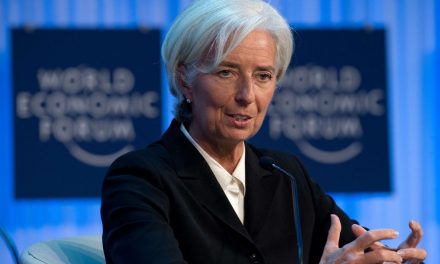Greece’s departure from the euro is now likely enough that officials from the single-currency area act as if they have come to terms with such an outcome, according to Martin Sorrell.
“They’ve almost got into the mind of, ‘Look, it’s going to happen, let’s get on with our lives,’” the chief executive officer of WPP Plc told Francine Lacqua in a Bloomberg Television interview on Thursday, citing discussions on a visit to Brussels last week. “The odds have moved closer to them going” and it’s “not a given, but more than 50-50,” he said.
That’s more than the median estimate of a 30 percent likelihood in a Bloomberg survey of economists published on Friday. The head of the world’s biggest advertising company spoke as Greek Prime Minister Alexis Tsipras kept working to strike a deal with the country’s creditors by the end of this month, holding talks with German Chancellor Angela Merkel in what one government official called a “positive environment.”
“I was in Washington last week, last Friday, and I asked somebody who should know, what he or she thought,” Sorrell said. “I said, ‘Should I be worried or not?’ And he or she said, ‘No, you should feel OK, but it’s going to be bumpy.’ Which I took to mean: Greek exit.”
‘Little Bit Tired’
Sorrell’s comments came on the eve of a meeting of euro-area finance ministers in Riga, Latvia, where they will attempt to persuade Greece to commit to economic reforms in return for aid payments. Citigroup Inc. economist Ebrahim Rahbari coined the term “Grimbo” this week to describe the lack of resolution to the standoff.
The yield on Greece’s 3.375 percent securities maturing July 2017 fell 2 basis points from yesterday to 24.8 percent. The yield reached a high for the year on Apr. 21 of 29.6 percent. The Greek ASE stock index is down 8.7 percent since the start of the year.
“I don’t think that we will make decisive progress today regarding the question of Greece,” German Finance Minister Wolfgang Schaeuble said, arriving for the talks. His Austrian counterpart Hans Joerg Schelling said “we can’t confirm that there is essential progress” in negotiations, and Slovakia’s Peter Kazimir told reporters he feels a “little bit tired” about Greece discussions because “we talk, talk and the substance is missing.”
Time for Greece is running out. The country has to return 770 million euros owed to the International Monetary Fund on May 12 and pay about 1.5 billion euros in wages and pensions at the end of this month.
Knock-On Effects
The chances of Greece missing some of its debt payments in the coming weeks are 40 percent, according to the median estimate in a Bloomberg survey of 29 economists. Yet, almost four in five respondents said a default won’t necessarily trigger a euro exit.
Greece leaving the single currency would also would have an impact on other European countries, Sorrell said, including the U.K., because of its potential referendum on membership in the European Union.
That could happen if Conservative Prime Minister David Cameron clings onto power after voters cast their ballots on May 7. With less than two weeks until the general election, the Conservatives and the opposition Labour Party remain neck-and-neck in the polls. Cameron has pledged to hold an in-or-out vote by the end of 2017.
“If it’s a total disaster in Greece, and people see that it’s a total disaster, then obviously I think it would make people more nervous about coming out,” Sorrell said. “If they did go out without catastrophe, it might have the opposite impact.”
Sorrell said he thinks the U.K. decision would be to stay in, because Western Europe’s economy will strengthen. “In any event, whether or not we have a Greek exit, it’s going to be a bumpy road for us if we have a referendum,” he said.



















